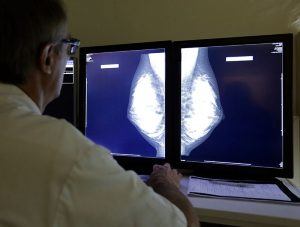Heidi Ledford in Nature:
 A massive study of nearly 4,000 variants in a gene associated with cancer could help to pinpoint people at risk for breast or ovarian tumours. The information is sorely needed: millions of people have had their BRCA1 gene sequenced. Some variations in the DNA sequence of BRCA1are linked to breast and ovarian cancer; others are thought to be safe. But the effects of most variants are unknown, leaving patients and physicians alike at a loss to interpret the results. The study, published on 12 September in Nature1, examined the effects of thousands of such variants on the survival of cells grown in the laboratory. The findings could help physicians to interpret the mutations’ significance. For example, a variant that hampers a cell’s ability to repair DNA in the lab might also be linked to cancer in the clinic.
A massive study of nearly 4,000 variants in a gene associated with cancer could help to pinpoint people at risk for breast or ovarian tumours. The information is sorely needed: millions of people have had their BRCA1 gene sequenced. Some variations in the DNA sequence of BRCA1are linked to breast and ovarian cancer; others are thought to be safe. But the effects of most variants are unknown, leaving patients and physicians alike at a loss to interpret the results. The study, published on 12 September in Nature1, examined the effects of thousands of such variants on the survival of cells grown in the laboratory. The findings could help physicians to interpret the mutations’ significance. For example, a variant that hampers a cell’s ability to repair DNA in the lab might also be linked to cancer in the clinic.
…The American College of Medical Genetics and Genomics recognizes about 60 genes for which screening might suggest a medical plan to preventor reduce the effects of a disease. Yet often when people find out that their genes include unusual DNA sequences , they are at a loss to interpret that finding. “These variants are nightmarish,” says Alvaro Monteiro, a geneticist at the Moffitt Cancer Center in Tampa, Florida. “The result becomes: ‘Well, you have something, but we just don’t know exactly what it is.’” Assays for genetic causes of hearing loss are a prime example: about half of the people who undergo such testing find out that they carry variants whose significance is unknown, says Heidi Rehm, a geneticist at the Broad Institute of MIT and Harvard in Cambridge, Massachusetts. “It’s a definite challenge in all genetic testing areas,” she says.
More here.
